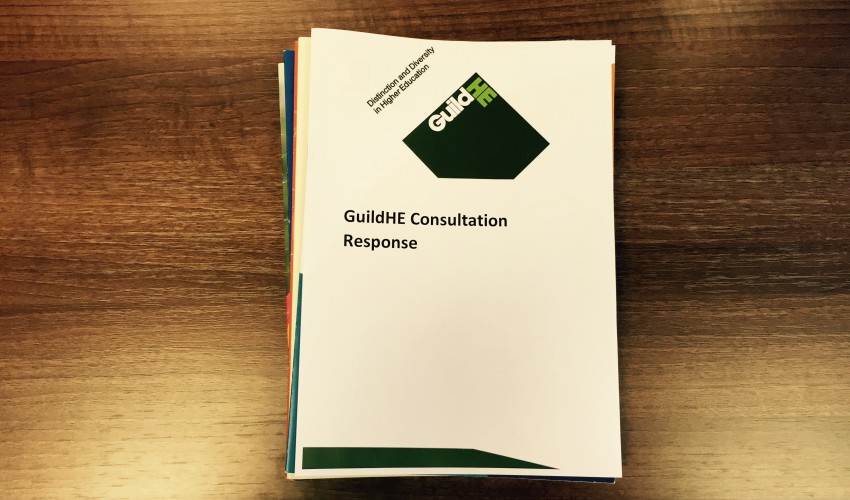GuildHE responds to the OfS Quality and Standards Consultation
GuildHE and our members strongly agree that students should receive high quality teaching and learning, wherever and whatever they are studying. Universities and colleges are committed to continually enhancing their provision and maintaining high academic standards. GuildHE has worked closely with Universities UK and QAA over a number of years to further support institutions in this aim and to tackle grade inflation.
We further welcome the recognition of the diversity of the higher education sector with the establishment of the baseline for quality and understanding that institutions are able to innovate and define high quality education above the baseline.
We do however have a number of concerns with the proposals as we outline in our response to the consultation.
Coherence with B3 and TEF
We agree with many of the proposals outlined in this consultation but it will also be important to consider these in the context of the amended B3 and TEF when these are consulted on in the Autumn to ensure that the coherence remains.
It is difficult to form a judgement on the principles outlined in this document without seeing how these will be implemented in practice. This is important both in terms of the specific baselines that will be proposed and also how these will be investigated taking into account the specific context of the provider and drawing on expert academic judgement. We would also need more information on the actions and sanctions that the OfS will take following investigation, this information needs to be seen in the round before we are able to fully comment in the proposals in this consultation.
Given the uncertainty surrounding the ongoing impact of the pandemic the OfS should not be seeking to create further disruption by implementing the outcomes of this consultation in the Autumn. It would make more sense to await the outcomes of the B3 and TEF consultations and implement all the recommendations at the same time to ensure coherence between all the proposals. Any changes resulting from both consultations must be mindful of the other pressures facing the higher education sector as we build back from the pandemic.
Extension of OfS Conditions to all provision from a registered provider
The proposals to extend the ongoing conditions to all higher education courses and provision whether they receive OfS/public funding or not raises a number of questions and could prompt a number of unintended consequences. The analysis of the phase 1 consultation responses (paras 142-148) outline concerns from the sector and the OfS’s response. We remain concerned that this would result in a massive expansion in the OfS and regulatory burden and question how this provision would be monitored (particularly when considering outcomes in the context of a revised B3).
We believe that the additional regulatory cost and burden on the sector would be disproportionate to the risk presented. Additionally, we are concerned that it may impact on the number of partnerships and the breadth of offer both of which could limit student choice or indeed it could just result in ever-more complex corporate structures for providers seeking to limit their liability. It will be important for the OfS to further consider the unintended consequences of this proposal before implementation.
These concerns would also apply to the extension to cover TNE. As a principle we can see the logic, but there are questions about whether the OfS has the processes to allow it form a judgement on this provision. In particular the lack of current data would make this proposal highly difficult to monitor with some outcomes data exceptionally difficult to use in a meaningful way, especially related to employment outcomes. Furthermore, we question whether, even if the metrics were developed, they would enable the regulator to make comparable judgements to other provision that an institution offers given the different national contexts and labour markets (are definitions of professional and managerial jobs the same in different regions of the word?). Much TNE provision is also already regulated by in-country provision and the need to prevent duplication of regulatory burden must be considered and risks damaging UK education exports because of duplicated regulatory burden. The OfS should focus on provision where it is able to make a evidence-based decisions, and not expand to other areas until it is able to do make robust judgements.
Quality Code removal
We fundamentally disagree with the proposal to remove references to the Quality Code. This proposal was only agreed to by a “small number of respondents” (para 198, OfS) in the OfS Analysis of the Phase 1 Consultation and a “substantial number of respondents did not agree” (para 199). The Quality Code provides the UK-wide framework that helps provide coherence to the quality systems of the four nations of the UK and strengthens the international reputation of UK HE and should not be disregarded. The Quality Code is not owned by any one agency and was developed by, and for, the sector setting out a sector agreed framework for both quality and standards. The Quality Code would likely meet the threshold outlined in HERA as being a sector-recognised standard of both being determined by, and having the confidence of, a broad range of registered higher education providers. The elements relating to standards should therefore be considered as sector recognised standards in the true sense of co-regulation and HERA outlines that the OfS must only assess standards against sector recognised standards.

